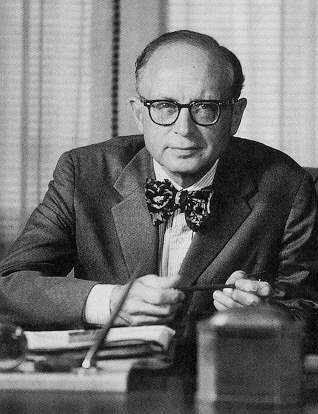
Daniel Joseph Boorstin was an American historian at the University of Chicago who wrote on many topics in American and world history. He was appointed the twelfth Librarian of the United States Congress in 1975 and served until 1987. He was instrumental in the creation of the Center for the Book at the Library of Congress.
The Library of Congress's Center for the Book was founded in 1977 by Daniel J. Boorstin, the Librarian of Congress, to promote literacy, libraries, and reading and an understanding of the history and heritage of American literature. The Center for the Book is mainly supported by tax-deductible donations.

In culture, a "fig leaf" or "fig-leaf" is a literal or figurative method of obscuring an act or object considered embarrassing or distasteful with something of innocuous appearance. The use of an actual fig leaf for the purpose originates in Western painting and sculpture, where leaves would be used by the artist themselves or by later censors in order to hide the genitalia of a subject. Use of the fig plant in particular came about as a Biblical reference to the Book of Genesis, in which Adam and Eve used fig leaves to cover their nudity after eating the forbidden fruit from the tree of the knowledge of good and evil.
The Americans is a 2013 TV series set in the Cold War period.
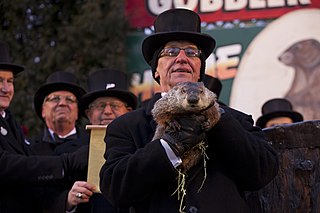
A media event, also known as a pseudo-event, is an event, activity, or experience conducted for the purpose of creating media publicity. It may also be any event that is covered in the mass media or was hosted largely with the media in mind.

The Discoverers is a non-fiction historical work by Daniel Boorstin, published in 1983, and is the first in the Knowledge Trilogy, which also includes The Creators and The Seekers. The book, subtitled A History of Man's Search to Know His World and Himself, is a history of human discovery. Discovery in many forms is described: exploration, science, medicine, mathematics, and more-theoretical ones, such as time, evolution, plate tectonics, and relativity. Boorstin praises the inventive, human mind and its eternal quest to discover the universe and humanity's place in it.
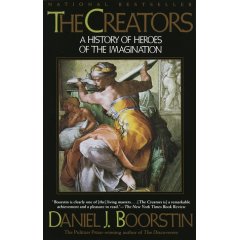
The Creators: A History of Heroes of the Imagination is a non-fiction work of cultural history by Daniel Boorstin published in 1992. It was preceded by The Discoverers and succeeded by The Seekers.

The Seekers is a 1998 non-fiction work of cultural history by Daniel Boorstin and is the third and final volume in the "knowledge" trilogy.

The myth of the flat Earth, or the flat-Earth error, is a modern historical misconception that European scholars and educated people during the Middle Ages believed the Earth to be flat.
Creator or The Creator may refer to:
Aliteracy is the state of being able to read but being uninterested in doing so. This phenomenon has been reported on as a problem occurring separately from illiteracy, which is more common in the developing world, while aliteracy is primarily a problem in the developed world. In 2002, John Ramsey defined aliteracy as a loss of a reading habit usually since reading is slow and frustrating for the reader.
Popular history, also called pop history, is a broad genre of historiography that takes a popular approach, aims at a wide readership, and usually emphasizes narrative, personality and vivid detail over scholarly analysis. The term is used in contradistinction to professional academic or scholarly history writing which is usually more specialized and technical and thus less accessible to the general reader.

The Broken Oath is a 1910 silent short film starring Florence Lawrence, directed by Harry Solter, and produced by Carl Laemmle. It was the first film to marquee the name of an actor, Lawrence, to promote a film.

The American Studies Association (ASA) is a scholarly organization devoted to the interdisciplinary study of U.S. culture and history. It was founded in 1951 and claims to be the oldest scholarly organization devoted to these topics. The ASA works to promote meaningful dialogue about the United States of America, throughout the U.S. and across the globe. Its purpose is to support scholars and scholarship committed to original research, innovative and effective teaching, critical thinking, and public discussion and debate.
Consensus history is a term used to define a style of American historiography and classify a group of historians who emphasize the basic unity of American values and the American national character and downplay conflicts, especially conflicts along class lines, as superficial and lacking in complexity. The term originated with historian John Higham, who coined it in a 1959 article in Commentary titled "The Cult of the American Consensus". Consensus history saw its primary period of influence in the 1950s, and it remained the dominant mode of American history until historians of the New Left began to challenge it in the 1960s.
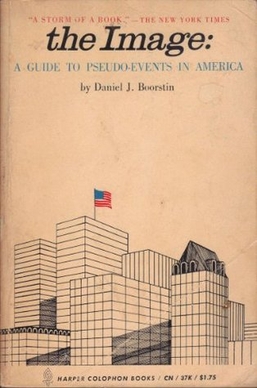
The Image: A Guide to Pseudo-events in America is a 1962 book by the political historian Daniel J. Boorstin. In his book, Boorstin argues that Americans have a false "image" of what "news" actually is. He argues that Americans mistake certain "pseudo-events" for real news, when in fact they are the contrivances of politicians and news corporations.
Robert Green McCloskey was an American political historian.
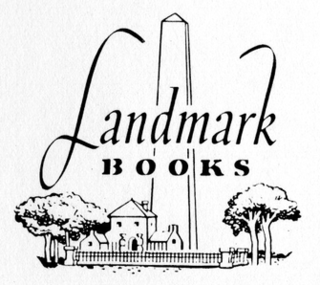
Landmark Books was a children's book series published by Random House from 1950 to 1970, featuring stories of significant people and events in American history written by popular authors at the time. The series expanded in 1953 to include world history as a sub-series called World Landmark Books, and a second sub-series of larger-format books illustrated with color artwork or black and white photographs was introduced in the 1960s as Landmark Giant, which would continue releasing new titles beyond the end of the main series until 1974. Select titles from the American and World series were reissued in paperback from the 1980s to the early 2000s.

Julia Boorstin Samuelson is an American news correspondent, reporter and author. Since 2006, Boorstin has been reporter and the Senior Media & Tech Correspondent for CNBC, focussing on new media and technology.














